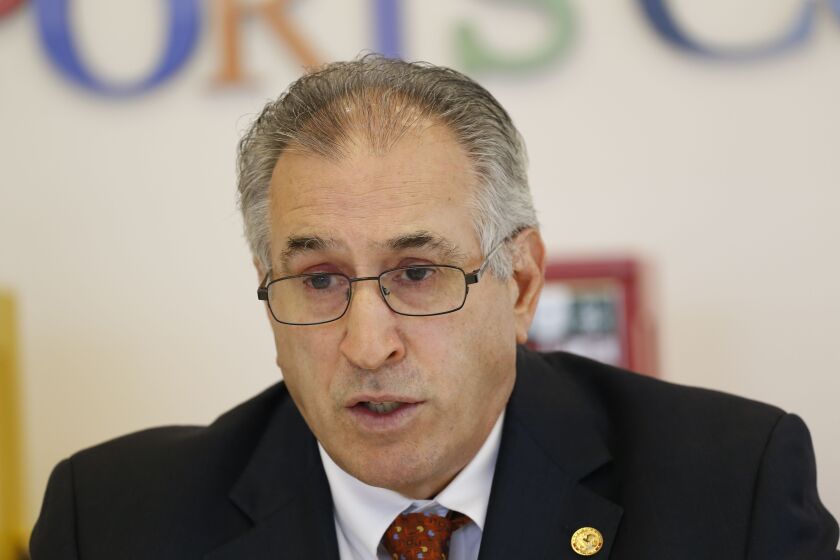A year after recreational pot sales kicked off in Illinois, legalization has been a boon for the few multimillion-dollar companies granted permission to grow and sell weed and a windfall for local and state governments strapped for cash.
But it’s also been a jackpot for a host of former cannabis regulators who are now cashing in on Illinois’ “green rush.”
On top of that, two sponsors of the law that legalized recreational cannabis are also benefiting from the pot industry — albeit through connections to firms operating in other states.
State Rep. Marty Moylan (D-Des Plaines) has now introduced legislation that would strengthen conflict of interest provisions in the legalization law that aim to prevent lawmakers, regulators and their families from profiting off the industry.
“For far too long in Illinois we have seen public officials abuse the public trust for their own benefit. It is time we enact much stronger ethics laws, especially concerning the growing cannabis industry where a lot of money is now flowing,” Moylan, a staunch critic of the legalization effort, said in a statement announcing the bill last month.
A conflict of interest ban was added to the recreational pot legislation after it was reported that state Sen. Patricia Van Pelt (D-Chicago) was holding cannabis-related seminars and leading a company that intended to obtain licenses to grow and sell marijuana. Van Pelt was ultimately removed as a sponsor of the legislation and abstained from voting, but her involvement in the business sparked an investigation by the Illinois Secretary of State’s office that’s ongoing.
Legislators, pot regulators and their family members currently face restrictions if they worked for the state during a two-year period stretching back to the law’s effective date in June 2019. Those individuals are barred from applying for or holding licenses created under the law and they can’t have an interest in a licensed company unless it’s a passive investment in a publicly traded firm.
Moylan’s bill goes a step further and would block those same individuals from accepting employment with a licensed company and passively investing in one.
But the plan does little to rein in those already profiting.
That’s because many ex-regulators worked for the state before recreational pot was legalized and weren’t involved in doling out the new licenses. Some are further dodging scrutiny by doing legal and consulting work and teaming with firms operating outside Illinois.
Former Ald. Dick Simpson (44th), now a professor of political science at the University of Illinois at Chicago, said it’s “a good idea something is being introduced,” though he favors “more sweeping prohibitions” to curtail potentially unethical behavior.
“Any time you have people using the special knowledge they’ve gained as part of government to increase their private income, that opens up the area of potential conflicts that in their worst form become corruption,” noted Simpson.
Lawmakers
Moylan’s bill appears to target Candace Gingrich, the spouse of state Rep. Kelly Cassidy, a Chicago Democrat who led the effort to legalize recreational marijuana.
Just a month after Gov. J.B. Pritzker signed that law, Gingrich was announced as the vice president of business development for Revolution Florida, a “sister company” to the Streeterville-based pot firm Revolution Global. Because Revolution already earned a license to grow recreational pot in Illinois, Moylan believes Gingrich should be barred from working for its Florida subsidiary.
Since 2017, Cassidy has pulled in at least $15,550 in campaign contributions from individuals and entities tied to Illinois’ legal cannabis industry. That includes $4,000 from Revolution and its former chief executive.
Cassidy didn’t respond to requests for comment on the bill, though she previously denied her spouse’s work in the industry poses a conflict.
Moylan’s measure wouldn’t affect state Rep. Bob Morgan, another pro-pot lawmaker from Deerfield.
In 2015, Morgan bounced from serving as the first statewide coordinator of the medical cannabis program to representing some of the state’s largest pot firms. Then in 2019, he took office and sponsored laws that fully legalized the drug and made the state’s medical program permanent, along with Cassidy.
Morgan is now a partner at Benesch, a Loop-based law firm with a robust cannabis practice. According to the firm’s website, Morgan is representing Red Arrow Farm, a cannabis cultivator in Michigan.
While previously working at Much Shelist, another downtown law firm known for its cannabis section, Morgan’s clients included Green Thumb Industries, Cresco Labs and PharmaCann.
Morgan has since tallied at least $57,250 in campaign contributions from donors linked to the state’s cannabis industry. More than half of that — $34,350 — has come from the companies he represented or individuals affiliated with them.
Morgan has said he stopped practicing “Illinois cannabis law” when he first became a candidate in 2017. But as with Revolution, the legalization of recreational cannabis was a coup for the companies he represented. In addition to getting the inside track on growing, those firms were also granted additional dispensary licenses and a head start to sell recreational pot.
In a statement, Morgan said the issue of ethics reform is “bigger than one industry.”
“Although Representative Moylan’s idea builds off the existing cannabis industry ethics laws, I would broaden this approach to any matter before the general assembly, institute a revolving door ban for lawmakers, mandate personal financial disclosures of assets and liabilities modeled after federal rules, and create severe criminal penalties for lawmakers for breaching them,” Morgan said.
Regulators
For now, Moylan’s bill also wouldn’t affect five former regulators who are now profiting off pot, including those linked to startups vying for the next batch of recreational dispensary licenses.
- Jay Stewart served from 2011 to 2016 as the director of the Illinois Department of Financial and Professional Regulation, the state agency that oversees pot shops. He’s now consulting for Green Renaissance Illinois, or GRI Holdings, a clouted dispensary applicant group with deep ties to state government that’s up for the maximum 10 licenses.
- Cook County Commissioner Bridget Degnen was the deputy director of medical cannabis program from the IDFPR from 2013 to 2017, when she left to run for office. She has since collected at least $14,700 in pot-related campaign donations and joined AmeriCanna Dream, another applicant group looking to score 10 licenses.
- Tara Meyer succeeded Degnen at the IDFPR, serving from 2017 to 2018 before leaving state government to become her successor’s chief of staff. Meyer is also partnered in AmeriCanna Dream.
- Joseph Wright succeeded Morgan as the director of the medical program, serving from 2015 to 2016 and earning the moniker “Cannabis King.” Wright has since started a pot-centric consultancy in Ravenswood and a Canadian company called NuSierra that specializes in “pharmaceutical grade cannabis oil.”
- Jeff Cox is the most recent cannabis regulator to jump into the industry. After working as the Illinois Department of Agriculture’s chief cannabis regulator from 2016 until last June, Cox is now consulting for pot firms operating outside Illinois and effectively circumventing the state’s revolving door policy.
Cox is working for NMI Management Group, a consultancy led by Leonard Mahler and David Flood, businessmen tied to the Consume dispensary chain and the Progressive Treatment Solutions cultivation center in East St. Louis. Cox was still heading the agriculture department’s pot section when PTS and the state’s other cultivators were awarded new licenses to grow recreational marijuana.
Flood also served until 2019 as the treasurer and principal officer of the influential and deep-pocketed Medical Cannabis Alliance of Illinois, which is now known as the Cannabis Business Association of Illinois. The two companies he’s aligned with have become huge campaign donors, dishing out a combined $139,000 in contributions — $5,000 of which went to Cassidy.
Records show George Archos, the chief executive of the massive Chicago-based pot firm Verano Holdings, was also an officer of NMI Management. However, Archos is no longer listed in the company’s state filing.
Expert: Pass ‘broadest prohibition you can’
Under Moylan’s bill, all those regulators could continue to operate in the cannabis industry with impunity. Simpson said addressing the potential conflicts of interest begins with lawmakers passing “the broadest prohibition you can.”
“If that proves insufficient [and] the conflicts really turn into cases like with the ComEd lobbying — they become outright corruption — you’ll have to strengthen the legislation,” he said.
Cox and Stewart didn’t respond to requests for comment. Through a spokeswoman, Degnen acknowledged that the measure doesn’t affect her work with AmeriCanna Dream. And like Morgan, Wright and Byrne said they broadly support Moylan’s plan.
Moylan described his bill as the “start of transparency,” saying it’s merely a jumping-off point. Meantime, he has also introduced a companion bill that would require the state to publicly disclose the owners of firms that apply for and hold cannabis licenses.
“This is phase one of multi-pronged legislation that I plan to introduce to put more sunshine on who’s actually profiting — not only from ownership — but legislators and officials who are also profiting.”








